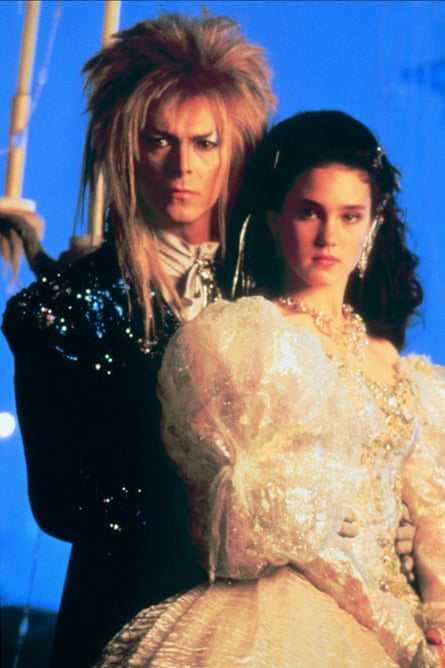“It’s only for ever … not long at all,” sang Jareth, David Bowie’s silver-tongued villain, in the title song of 1986’s beloved puppet-filled adventure, Labyrinth. Like St Vincent, and so many other 80s children, my introduction to Bowie arrived via the screen rather than the family turntable, in the form of Jim Henson’s film – so beloved that, 30 years on, adults hold outdoor cinema events and fancy dress balls to relive its magic.
I missed the pleasure of seeing Labyrinth on the big screen (trips to the nearest Odeon, in Hammersmith, were a treat for special occasions only). Instead, I saw a programme about the making of the film one hot, feverish day, off school and bundled up in blankets, nestled between my parents on the sofa. The puppets, the sets and Bowie’s magnificent crystal ball trick captivated us; a few years later, they bought me a VHS copy of the film for my birthday.

I treasured it, watched it relentlessly, memorising every line of the script, every note of the film’s timeless, electrifying score. I hadn’t heard Bowie’s hits at that point. I didn’t care that, in his other life, he was this big, important rock star – a fact impressed on me by the adults.
I didn’t need that context to know why I lusted after him with a fierce, pre-teen intensity. I was infatuated with Jareth, the goblin king, for the same reasons his adult, vinyl-collecting fans were: his charisma, his queerness, his voice.
But there was something deeper at work in the film. It wasn’t just the strange, thrilling paradox of fear and desire I felt watching this villain as he courted Jennifer Connelly’s Sarah, the film’s cosplay-loving protagonist. It was the rare parity at work between the leads.
As the feminist film writer Sophie Mayer points out, Sarah lasts as a hero for us after we grew up because she was such an unusually progressive character for 80s cinema. Her name may mean “princess” in Hebrew, but she “bursts the bubble of the princess fantasy in the scene at the heart of Labyrinth”.
“Equally adept at using her lipstick as a cunning tool or fighting off goblin soldiers, Sarah was adept and affective, neither hyper-feminine nor forced into a masculinised version of heroism. She was selfish, bitter, headstrong, clever, and above all, wanted things to be fair. Not a princess but a proto-Notorious RBG [Ruth Bader Ginsburg] justice.”
How to play the foil to such a gutsy, stereotype-busting lead? It would’ve been easy for Bowie to have stolen the spotlight from Connelly’s young, unknown lead, to use cachet and ego to press his way to the film’s centre. Instead, he plays his part in tandem with Connelly, as a perfect counterweight. Jareth works around Sarah’s power, feeling out weak spots: her need for escape and adventure; her lack of maternality, her girlhood, music-box daydreams of princess finery and chivalrous romance. He manipulates her, tricks her, woos her.
But, ultimately, he loses. And he does it all with the gravity of someone battling a worthy opponent – an equal. To dim the force of his power as a co-star would have been patronising to Connelly. Instead, Bowie levels everything he has at her, trusting her to meet the challenge and survive – which she does, with career-making brilliance.
How radical, then, to see a teenage girl not just slaying a lead fantasy role with her badassery, but battling a bona fide rock legend who takes her seriously, as both love interest and foe. Critics and viewers enjoyed poking fun at Bowie’s mullet-and-codpiece get-up, but I watch Labyrinth and I see a man who relished the complexities of women’s power, who understood #masculinitysofragile and the joy to be had in queering gender roles. I see a grown man who was used to being worshipped but was fearless enough to play the loser in this lambent, young feminist epic.

Comments (…)
Sign in or create your Guardian account to join the discussion